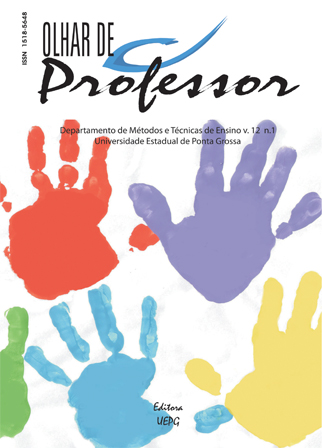ESCRITAS DE PROFESSORES: TRILHAS NARRATIVAS PARA TORNAR-SE UM PROFESSOR-PESQUISADOR - Doi: http://dx.doi.org/10.5212/OlharProfr.v.12i1.075094
Main Article Content
Abstract
A reflexividade docente é o pano de fundo deste
artigo que considera o professor um profissional que atua
como sujeito na formulação de propósitos e objetivos
de seu trabalho, bem como das estratégias e dos meios
os mais adequados para atingir as metas desejadas,
sendo a narrativa uma delas. Além disso, acreditamos
que a reflexividade é constituída, necessariamente, pela
possibilidade de fundamentar teoricamente as tomadas
de decisão cotidianas na direção de uma ação cada vez
mais intencional. A partir deste pressuposto, narramos
os caminhos que têm sido trilhados por professores-pesquisadores, partícipes de dois projetos em parceria entre
a escola e a universidade públicas, em que a escrita narrativa
de textos é uma prática na direção da promoção da
reflexividade docente. A construção desta escrita ocorre
a partir de registros das experiências vividas, de leituras,
de trocas de conhecimento com os alunos e colegas de
trabalho, de observação e interação com o outro e com
o seu espaço, realizada sistemática e cotidianamente por
todos os participantes, o que promove uma transformação
profunda no processo ensino-aprendizagem.
Downloads
Article Details
Authors who publish in this journal agree with the following terms:
a) Authors keep the copyrights and concede the right of its first publication to the magazine. The work piece must be simultaneously licensed on the Creative Commons Attribution License which allows the paper sharing, and preserves both the author identity and the right of first publication to this magazine.
b) Authors are authorized to assume additional contracts separately, to not-exclusively distribution of the paper version published in this magazine (e.g.: publish in institutional repository or as a book chapter), with the author identity recognition and its first publication in this magazine.
c) Authors are permitted and stimulated to publish and distribute their papers online (e.g.: in institutional repository or on their personal webpage), considering it can generate productive alterations, as well as increase the impact and the quotations of the published paper.
d) This journal provides public access to all its content, as this allows a greater visibility and reach of published articles and reviews. For more information on this approach, visit the Public Knowledge Project, a project that developed this system to improve the academic and public quality of the research, distributing OJS as well as other software to support the publication system of public access to academic sources.
e) The names and e-mail addresses on this site will be used exclusively for the purposes of the journal and are not available for other purposes.

This work is licensed under a Creative Commons Attribution 4.0 International License.





